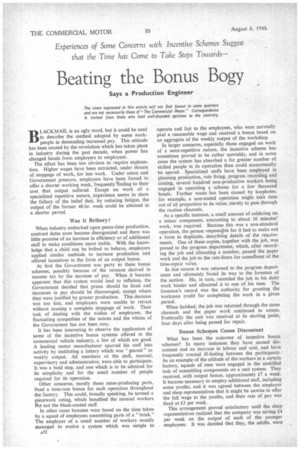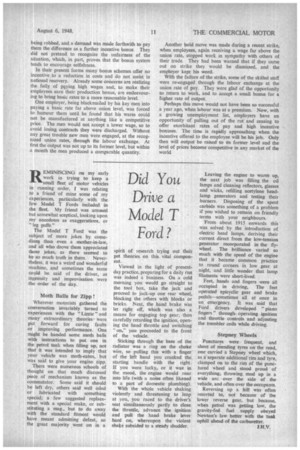Experiences of Some Concerns with Incentive Schemes Suggest
Page 34

Page 35

If you've noticed an error in this article please click here to report it so we can fix it.
that the Time has Come to Take Steps Towards—
Beating the Bonus Bogy
Says a Production Engineer
The views expressed in this article will not find favour in some quarters and are not necessarily those of" The Commercial Motor." Correspondence is invited from those who hold well-founded opinions to the contrary.
BLACKMAIL is an ugly word, but it could be used to describe the method adopted by some workpeople in demanding increased pay. This attitude has been caused by the revolution which has taken place in industry during the past decade, when power has changed hands from employers to employees.
The effect has been too obvious to require explanation. Higher wages have been extracted, under threats of stoppage of work, for less work. Under union and Government pressure, employers have been forced to offer a shorter working week, frequently'finding to their cost that output suffered. Except on work of a specialized repetitive nature, experience seems to show the fallacy of the belief that, by reducing fatigue, the output or the former 48-hr. week could be attained in a shorter period.
Was it Bribery?
When industry embarked upon peace-time production, contract dates soon became disorganized and there was little promise of an increase in efficiency or of additional staff to make conditions more stable. With the knowledge that a child can be bribed to behave, employers applied similar methods to increase production and offered incentives in the form of an output bonus.
At first the Government was party to these bonus schemes, possibly because of the revenue derived in income tax by the increase of pay. When it became apparent that this system would lead to inflation, the Government decided that prices should be fixed and increases in pay should be discouraged, except where they were justified by greater production. This decision was too late, and employers were unable to retract without causing a complete stoppage of work. Their task of dealing with the wishes of employees, the fluctuating sympathies of the unions and the whims of the Government has not been easy.
It has been interesting to observe the application of some of the incentive bonus systems offered in the commercial vehicle industry, a few of which are good. A leading motor manufacturer spurred his staff into activity by instituting a lottery which was " geared " to weekly output. All members ot the staff, manual, supervisory and administrative, were able to participate. It was a bold step, and one which is to be admired for its simplicity and for the small number of people required for its operation.
Other concerns, mostly those mass-producing parts, fixed a time-rate bonus for each operation throughout the factory. This could, broadly speaking, be termed a piecework rating, which benefited the manual workers Vut not the black-coated staff.
In other cases bonuses were based on the time taken by a squad of employees assembling parts of a "brick."
The employer of a small number of workers usually managed to evolve a system which was simple to A32
operate and fair to the employees, who were normally paid a reasonable wage and received a bonus based on an aggregate of the weekly output of the workshop.
In larger concerns, especially those engaged on work of a semi-repetitive nature, the incentive scheme has sometimes proved to be rather unwieldy, and in some cases the system has absorbed a far greater number of skilled people in its operation than could economically be spared. Specialized staffs have been employed in planning production, rate fixing, progress recording and costing, several hundred non-productive workers being engaged in operating a scheme for a few thousand hands. Further waste has been caused by loopholes; for example, a non-scaled operation might take time out of all proportion to its value, merely to pass through the routine channels.
As a specific instance, a small amount of soldering on a minor component, amounting to about 10 minutes' work, was required. Because this was a non-standard operation, the person responsple for it had to make out a form in duplicate, describing details of the require
ments. One of these copies, together with the job, was passed to the progress department, which, after recording the job and allocating a number, passed the paper work and the job to the rate-fixers for assessbent of the time-repair value.
In due course it was returned to the progress department and ultimately found its way to the foreman of
the section. He, in turn, recorded the job in his daily work binder and allocated it to one of his men. The foreman's record was the authority for granting the workman credit for completing the work in a given period.
When finished, the job was returned through the same channels and the paper work continued to amass. Eventually the unit was received at its starting point, four days after being passed for repair.
Bonus Schemes Cause Discontent What has been the outcome of incentive bonus schemes? In many instances they have caused discontent and an increase in labour and cost, and have frequently created ill-feeling between the participants.As an example of the attitude of the workers in a certain factory, squads of men were engaged in the unskilled task of assembling components on a unit system. They received, with 'output bonus, approximately E7 a week. It became necessary to employ additional staff, incligling some youths, and it was agreed between the employer and shop representatives that it might be unwise to offer the full wage to the youths, and their rate of pay was fixed at £3 per week.
This arrangement proved satisfactory until the shop representatives realized that the company was saving £4 per week on the output of each of the younger employees. It was decided that they, the adults, were being robbed, and a demand was made forthwith to pay them the difference as a further incentive bonus They did not pretend to recognize the unfairness of the situation, which, in part, proves that the bonus system tends to encourage selfishness.
In their present forms many bonus schemes offer no incentive.to a reduction in costs and do not assist in national recovery. Already some concerns are realizing the folly of paying high wages and, to make their employees earn their production bonus, are endeavouring to bring basic rates to a more reasonable level.
One employer, being blackmailed by his key men into paying a basic rate far above union level, was forced to humour them until he found that his wares could not be manufactured at anything like a competitive price. The men would not accept a lower wage, so to avoid losing contracts they were discharged. Without any great trouble new men were engaged, at the recognized union rates, through the labour exchange. At first the output was not up to its former level, but within a month the men produced a comparable quantity. Another bold move was made during a recent strike, when employees, again receiving a wage far above the union rate, stopped work in sympathy with others of their trade. They had been warned that if they came out on strike they would be dismissed, and the employer kept his word.
With the failure of the strike, some of the skilled staff were re-engaged through the labour exchange at the union rate of pay. They were glad of the opportunity to return to work, and to accept a small bonus for a higher rate of output.
Perhaps this move would not have been so successful a year ago, when labour was at a premium. Now, with a growing unemployment list, employers have an opportunity of pulling out of the rut and ceasing to offer exorbitant rates of pay and high incentive bonuses. The time is rapidly approaching when the incentive offered to the employee will be his job. Only then will output be raised to its former level and the level of prices become competitive in any market of the world




















































































